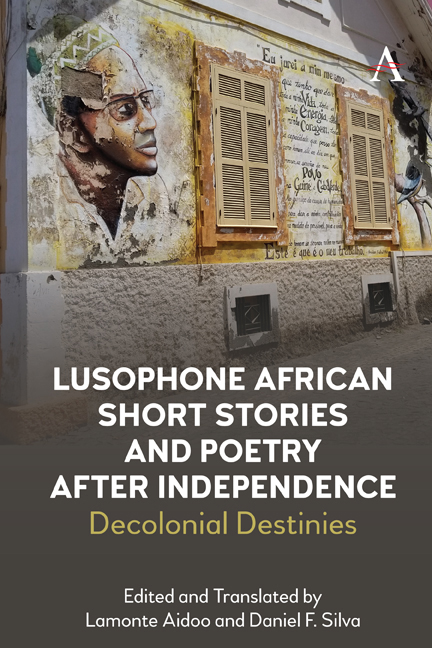Chapter 5 - Ondjaki
Published online by Cambridge University Press: 23 February 2022
Summary
Introduction
Ndalu de Almeida, known in the literary world as Ondjaki, was born in Luanda in 1977, the most prominent of the first generation of Angolan writers born after independence (November 11, 1975). His parents were anticolonial militants of the Movimento Popular para a Libertação de Angola (People's Movement for the Liberation of Angola, MPLA). His father, Júlio de Almeida, would later become a politician in the Angolan government during Ondjaki's childhood. As a young adult, he completed a bachelor's degree in sociology in Lisbon, before publishing his first literary work, a collection of poetry titled Actu Sanguíneu (Sanguine Act) in 2000.
In the last two decades since then, he has been both prolific and acclaimed across multiple literary genres, publishing six collections of poetry, five volumes of short stories, five novels, eight children’s/ adolescent books, and has even written and produced a play. Most of these have been translated in at least eight languages and have been published in at least 15 different countries. He has won 12 awards and prizes for his literature, in Angola, Brazil, Ethiopia, France, Italy, and Portugal. Among these are the prestigious Camilo Castelo Branco Short Story Grand Prize for his collection, Os da minha rua (The Kids from My Street, 2007); the Grinzane prize for best African writer in 2008; the Jabuti Prize in Literature in 2010, in the adolescent category for his Avó Dezanove e o segredo do soviético (Grandmother Nineteen and the Soviet's Secret, 2008); and the 2013 José Saramago Literary Prize for his novel, Os Transparentes (The Transparent Ones, 2012).
A persistent trait of Ondjaki's works across genres, one that has fueled his prominence in Angolan and Lusophone literatures as a sort of standard bearer of his literary generation, is the centrality of childhood characters and protagonists. This speaks very much to his own experience, living early postindependence nationhood as a child. His first novel, which garnered international attention across the Lusophone world, Bom dia, camaradas (Good Morning, Comrades, 2001), was a semiautobiographical/historical fiction account of a 12-year-old Ndalu and his friends growing up in postindependence Luanda and struggling to navigate class difference, the civil war, and Marxist school curricula at the end of the Cold War era.
- Type
- Chapter
- Information
- Lusophone African Short Stories and Poetry after IndependenceDecolonial Destinies, pp. 79 - 86Publisher: Anthem PressPrint publication year: 2021



